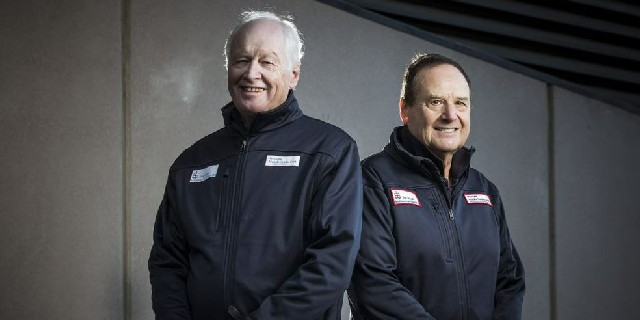Focusing on the golden hour
Professor Stephen Davis AO and Professor Geoffrey Donnan AO formed the Australian Stroke Alliance to close the health care gap in stroke care.
For the past 30 years, University of Melbourne alumni Professors Stephen Davis (MBBS 1972, MD 1985) and Geoffrey Donnan (MBBS 1972, MD 1980), have been collaborating on stroke research. Together, they founded Australia’s first mobile stroke ambulance and their work to improve stroke care in rural and regional parts of the country – particularly in the first ‘golden hour’ – continues.
The two researchers began their medical studies together at the University of Melbourne in 1967.
Geoffrey Donnan: “We’ve been collaborating on stroke issues for a long time now, particularly focusing on acute stroke in the first few hours. More recently, we developed an interest in pre-hospital stroke management and began Australia’s first mobile stroke ambulance, known as the Melbourne Mobile Stroke Unit. We then focused on how to bring the hospital to the stroke patient and in that situation, the most important element is to bring the image to the patient.
The major obstacle is the fact that in hospital, imaging devices weigh two or three tonnes, so, with colleagues around the country, we are developing ultra-lightweight imaging devices that can be transported by road and air to treat people on-site across Australia. Since earlier treatment improves outcomes, this should be of enormous benefit to people in rural and remote Australia.”
Stephen Davis: “Our concept is to take these imaging devices and put them in aircraft and rural standard stroke ambulances so the urban-rural divide can be bridged. There’s a huge disadvantage in access to healthcare in rural and remote Australia and people living in those areas have much worse outcomes after stroke. We are linking the new devices via a national digital platform, Zeus, that links remote paramedics or nurses with stroke experts who can interpret the on-site brain imaging and clinical data and recommend the best possible treatment.
When Geoff and I trained, there was no treatment for stroke, and it remains a huge problem. It’s the second most common cause of death worldwide and it’s a leading cause of disability.”
Geoffrey: “If we could treat every stroke within the first few minutes, or within the so-called ‘golden hour’, many people’s lives would return to normal. To do that, we need to get an image as soon as possible to distinguish between the two major causes of stroke. Around 85% are due to blockage – ischaemic stroke – and the rest are due to bleeds. If you do not make the correct diagnosis and give an inappropriate treatment there may be fatal consequences. In other words, without an image one is unable to treat patients with stroke. This is why the lightweight imaging devices are so important.
We’ve received a $40 million Frontiers grant from the Medical Research Future Fund – one of the biggest research grants ever awarded in Australia – to enable this work to be carried out.”
Stephen: “Two types of novel technologies are being used to develop these imaging devices – one is using electromagnetic radiation and one is using a unique form of nano CT technology. These portable, lightweight devices are in early prototype stage but we believe one or both will be in production in the next few years. They will only weigh 30 to 80 kgs – compared to a CT scanner in hospital that weighs two or three tonnes and the scanner used in our Melbourne Mobile Stroke Unit that is half a tonne. The new devices are small and light enough to fit into a regular road ambulance or aircraft, so we could get these devices into the field with the Royal Flying Doctor Service. This is an extraordinary opportunity to make a difference and to translate some of the developments of modern stroke medicine to help Australians on the ground.”
______________________________
Professors Stephen Davis and Geoffrey Donnan are both graduates of the MBBS Class of 1972, which celebrates its 50th reunion this year. Read some reflections from Professor Donnan and others as they mark this important milestone.
